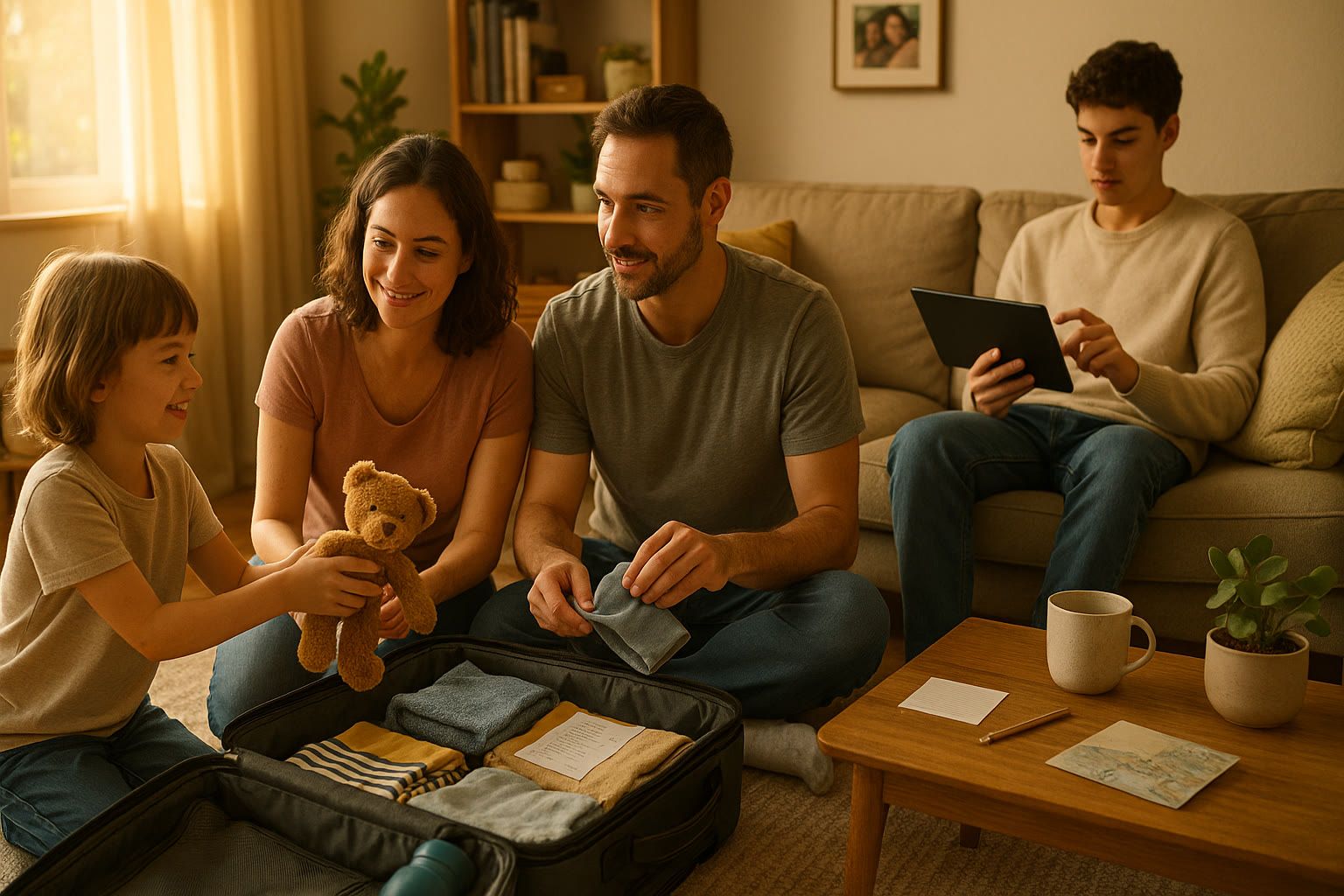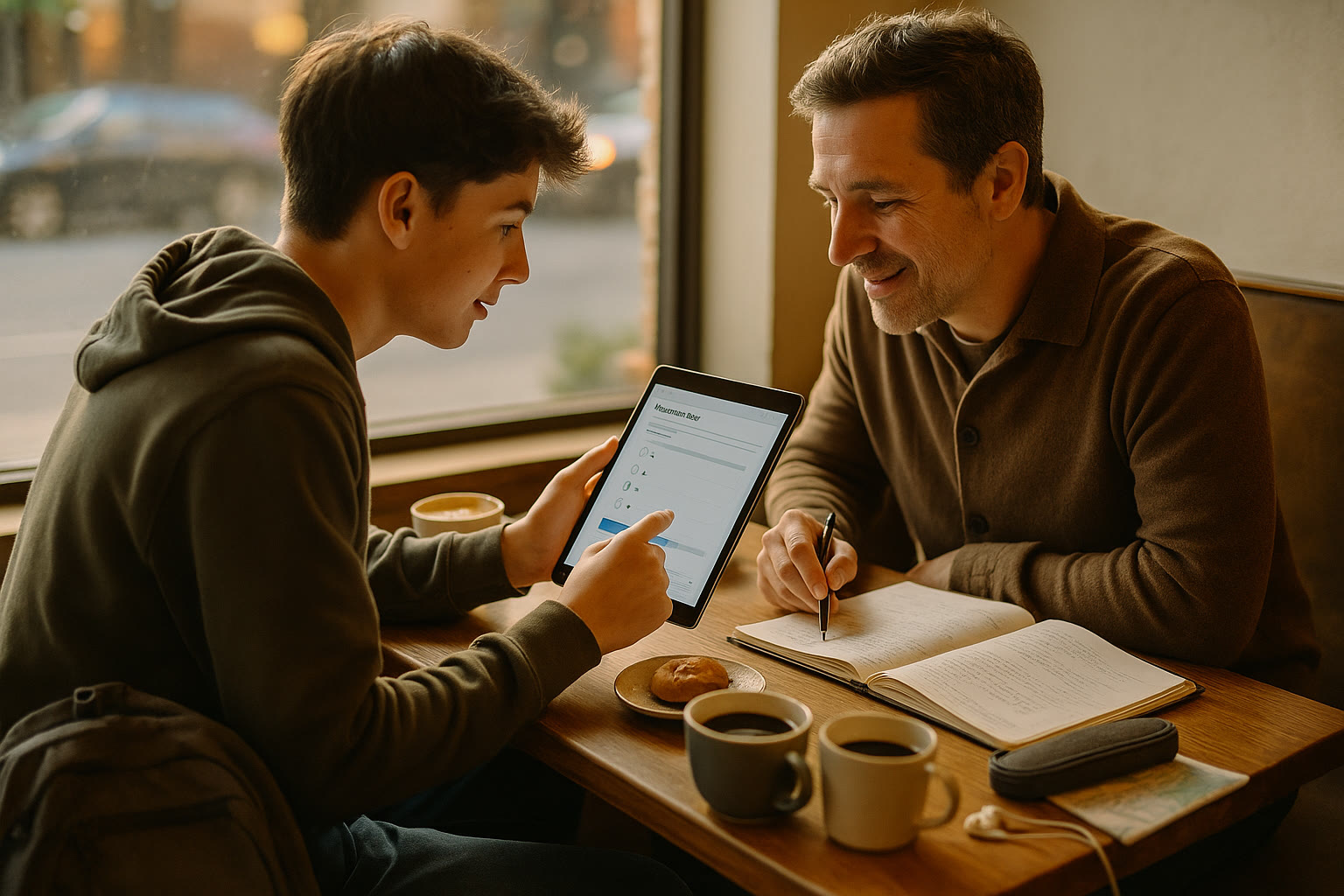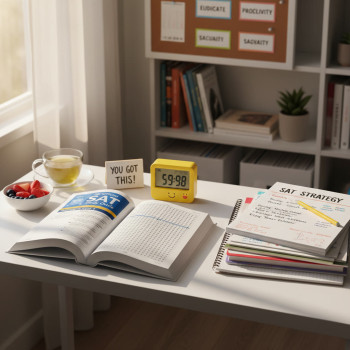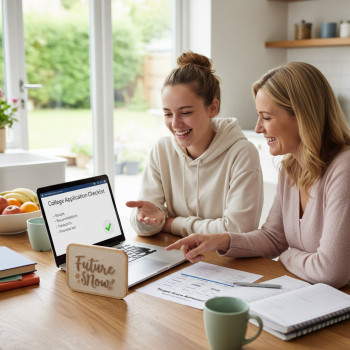Introduction: You Can Have Both — a Great Vacation and Solid SAT Prep
Family vacations are rare windows of connection and rest. They recharge teens (and parents), create lasting memories, and sometimes, reveal the best conversations you’ll ever have about college, life goals, and priorities. Yet when SAT season looms — especially now with the Digital SAT format — anxiety can creep in. The good news? With a little planning, clear priorities, and realistic expectations, you can enjoy a meaningful family trip without sabotaging the study rhythm that leads to a strong SAT performance.

Why the Digital SAT Changes (and Doesn’t Really Complicate) Vacation Planning
The Digital SAT has changed a few practical details — the test is shorter, adaptive in sections, and students take it on a device. Practically, that means practice should include full-length digital practice tests and familiarization with the testing app, but it also means the test is more forgiving in some ways: shorter overall time in a test setting and tools (like calculators during the math portion) built into the experience.
For vacation planning, this means two important things:
- It’s the quality of practice, not just the quantity, that matters. A few well-placed study sessions using official digital practice tools beat many unfocused hours.
- Adaptability is key. If a test-day or practice session happens while traveling (or right after), structuring timing and environment will keep performance steady.
Step 1 — Start With a Realistic Family Conversation
Open, calm talk is the foundation. Sit down a few weeks before booking anything and outline:
- When is the student’s planned SAT test date (or dates)?
- How many realistic study hours and full-length practice tests does the student need before that date?
- Which parts of the trip are non-negotiable (weddings, graduations, long-haul flights) versus flexible (side trips, certain days)?
Talking these things through keeps everyone aligned and prevents trips from becoming stressful for the student. If the SAT date is within two to four weeks of travel, you’ll want a tighter plan; three months out gives you more breathing room.
Step 2 — Map Your Calendar: When to Intensify vs. When to Pause
Think of the weeks leading up to the SAT as zones: heavy practice, maintenance, and tapering. Use the calendar to decide where the vacation sits.
- Heavy practice zone (6–12+ weeks out): Focus on content review, targeted practice, and weekly full-length digital practice tests.
- Maintenance zone (2–6 weeks out): Shorter sessions focused on weak spots, timed sections, and 1–2 full practice tests per week.
- Tapering zone (final week): Light review, timing strategies, sleep and nutrition prioritization.
Place your trip on that map. If your vacation sits in the heavy practice zone, plan to keep study windows intact. If it falls in maintenance or tapering, you can often afford to scale back a bit without losing momentum — and you’ll return refreshed.
Step 3 — Build a Travel-Friendly Study Schedule
Design study blocks that respect travel flow. Think micro-sessions and concentrated practice rather than long, rigid blocks.
- Morning power sessions (20–45 minutes): Short, focused work on a single skill — e.g., algebra review or grammar rules. Mornings are usually best because the brain is fresher.
- Afternoon review (15–30 minutes): Light practice, flashcards, or reviewing errors from previous practice tests.
- One digital mock test (when feasible): If travel allows, schedule a full-length practice test using the Bluebook app on a quiet day. Don’t force it on a busy sight-seeing day.
Example travel-week study plan:
| Day | Morning | Afternoon | Evening |
|---|---|---|---|
| Travel day (flight) | 20 min vocabulary/reading warm-up | Rest or light grammar exercises | Review travel-day notes (15 min) |
| Sightseeing day | 30 min math problem set (short) | Explore | 15–20 min error review from previous practice |
| Relax day | Full-length digital practice test (if feasible) | Recovery and family time | Go over practice test mistakes (30 min) |
Step 4 — Pack the Right Tools
Bring simple, effective tools so study sessions stay productive:
- A charged tablet or laptop with the official practice app (Bluebook) installed and updated.
- A pair of noise-cancelling or noise-reducing headphones for airplane or hotel study.
- Physical flashcards or an app for on-the-go review (vocabulary, math formulas, grammar rules).
- A small notebook for tracking errors and quick strategy notes.
Download any practice materials for offline use where possible. If your destination has spotty Wi‑Fi, pre-download practice sets and screenshots of tricky questions to review later.
Step 5 — Make Study Sessions Social and Low-Pressure
Turn tiny study moments into family-friendly rituals. A gentle approach keeps motivation high without making the vacation feel like a boot camp.
- Set a compact “study window” each morning before breakfast — short, predictable, and family-respected.
- Let family members cheer the milestones — finished a practice section? Celebrate with a favorite local snack.
- Use conversational practice: discuss a reading passage over coffee or explain a math concept to a parent. Teaching is a powerful way to retain material.
Step 6 — Protect the Essentials: Sleep, Nutrition, and Timing
Travel can throw sleep schedules and meals out of whack. Those are exactly the things that matter most for test performance. Make them non-negotiable.
- Sleep: Aim for consistent schedules, especially in the 5–7 nights before the test. If your vacation includes long flights or a time-zone change, plan buffer recovery days.
- Nutrition: Keep protein and steady energy snacks on hand. Sugary snacks give quick buzzes but hinder focus the next day.
- Exercise: Short walks or morning stretches reset attention and reduce test anxiety.
Managing Jet Lag and Time Zones
If your trip crosses multiple time zones less than a week before a test, consider rescheduling the test or booking recovery days upon return. If rescheduling isn’t possible, use these quick tactics:
- Shift sleep schedule by 30–60 minutes daily in the week before travel.
- On arrival, expose yourself to daylight and sync meal times to the new time zone.
- Avoid heavy study sessions in the immediate 24–48 hours after arrival. Focus on light review.
Step 7 — If You Must Miss a Full Practice Test, Replace It — Don’t Skip It
Full-length digital practice tests are invaluable because they build stamina and test the pacing students need. If your vacation means you can’t take a full mock test, replace it meaningfully:
- Simulate timing: Do two back-to-back timed sections (one Reading/Writing, one Math) and practice the digital tools you’ll use on test day.
- After a shorter practice, spend time reviewing every error — that’s where the score gains hide.
- Use guided review with a tutor (virtual or in-person) for 1–2 sessions during the trip if your schedule allows.
How Parents Can Support — Without Micromanaging
Parents play a critical role as cheerleaders, logistics managers, and emotional anchors. Here’s how to help without turning every moment into a test prep interrogation:
- Respect the agreed study windows. Treat them like appointments — quiet, uninterrupted time.
- Manage logistics: handle packing chargers, printing boarding passes, and identifying quiet corners in hotels or museums for short study bursts.
- Encourage autonomy: let the student set the specific study goals during those windows. Offer to quiz them casually, not like a pop exam.
- Keep conversations about college and testing positive and future-focused. Reinforce that one score does not define the whole narrative.
Using Personalized Support During Travel (Including Smart Tutoring Options)
Travel doesn’t have to mean a learning black hole. Personalized tutoring options can adapt around your trip schedule. Short 30–45 minute virtual sessions can be scheduled to review a practice test, go over errors, or practice timing strategies. If your student uses 1-on-1 guidance, these sessions become targeted, efficient, and well worth the time.
For families considering extra support, an option like Sparkl’s personalized tutoring can fit naturally into travel routines: tailored study plans that prioritize the student’s weakest skills, expert tutors who can meet virtually across time zones, and AI-driven insights that quickly identify high-impact practice areas — all of which can keep momentum without heavy time investments.
Recovery Plan: Returning Home and Getting Back on Track
Post-vacation is as important as what you do before and during the trip. The first week back should be a smart balance of rest and ramping up.
- Day 1: Light review — go through flashcards and low-stress materials to re-acclimate.
- Days 2–4: Focused practice on the top two weak spots identified before the trip.
- Day 5 onward: Resume full-length timed practice as scheduled.
If jet lag is a factor, allow a couple of buffer days for sleep normalization before any intense study days or a practice test. Emotional recovery matters, too — one or two gentle family check-ins can help the student process travel memories without feeling overwhelmed by immediately returning to full prep mode.
Real-World Examples: Two Practical Scenarios
Scenario A — A Seven-Day Beach Vacation Three Weeks Before the SAT
Plan: Use short morning 30-minute sessions and one full practice test on a low-activity day. Reserve the day after return for rest, then resume two targeted practice sections the next day.
Why it works: The student maintains regular, low-stress contact with prep, keeps sleep stable, and uses recovery time to re-establish intensity. The vacation becomes a restorative break rather than a disruption.
Scenario B — International Trip Crossing Two Time Zones One Week Before the SAT
Plan: Avoid scheduling full-length practice tests during travel. Focus on micro-sessions (20 minutes) for light review. Build two recovery days at home before the test for sleep normalization and a light practice test followed by review.
Why it works: Short-term memory and timing can be affected by time-zone shifts. Buffer days and light, focused reviews protect performance without increasing stress.
Simple Tools & Templates You Can Use
Here are quick templates that students and parents can adapt immediately:
- Daily travel study block: Morning (30 min skill work) + Evening (15 min error review).
- Mini practice test template: Two 35–45 minute timed sections back-to-back to simulate pacing.
- Recovery checklist: two nights of 8+ hours of sleep, balanced meals, light exercise, one brief practice test 48–72 hours before scheduled SAT.
How to Measure If the Vacation Affected Prep — and What to Do About It
Use objective measures, not emotions, to assess whether the vacation had a negative effect:
- Compare the practice-test score before the trip to the first full-length practice test after the trip. Expect slight variance; large drops point to sleep or timing issues.
- Track the number and type of errors: did they shift (e.g., from algebra mistakes to careless reading errors)? That helps target recovery sessions.
- Note stamina: if the student reports fatigue during the test, add stamina-building practice tests into the schedule with recovery days.
If the assessment shows gaps, prioritize targeted, short sessions on the most impactful weak areas. This is where personalized tutoring — 1-on-1 coaching and tailored study plans — is often most effective. Tutors can quickly triangulate the cause of score changes and prescribe high-impact practice.
Final Thoughts: Make the Trip Work for You
Family vacations and SAT prep are not mutually exclusive. With careful conversation, intentional scheduling, and small rituals that respect both family time and study needs, students can return rested and ready. Remember:
- Quality beats quantity: short, strategic practice beats unfocused hours.
- Recovery is part of preparation: rest and routine protect performance.
- Support is scalable: brief, personalized tutoring sessions (including options that offer tailored study plans and AI-backed insights) can keep progress steady with minimal disruption.
Make your vacation part of the plan — not an interruption to it — and you’ll create memories without sacrificing goals. When you return, your student will be refreshed, focused, and ready to show their best on the Digital SAT.

Quick Resources Checklist Before You Go
- Install and test the official practice app on the device you’ll travel with.
- Pack chargers, headphones, and a paper backup of critical notes.
- Agree as a family on study windows and recovery days.
- Schedule at least one post-trip practice test and a brief tutoring check-in (if using personalized tutoring).
- Prioritize sleep and hydration in the week before the test.
Closing: A Balanced Approach Wins
Parenting a teen through SAT season while keeping family life joyful requires both flexibility and structure. The best plans are simple, humane, and designed around the student’s energy and life. Whether you use self-guided practice, short targeted tutoring sessions, or a combination that includes personalized 1-on-1 guidance like Sparkl’s tailored study plans and expert tutors, the goal is the same: steady, confident progress and enough space to be a family.
Go ahead — book that trip. With thoughtful planning, the plane tickets, the photos, and the practice logs can all belong in the same suitcase.











No Comments
Leave a comment Cancel